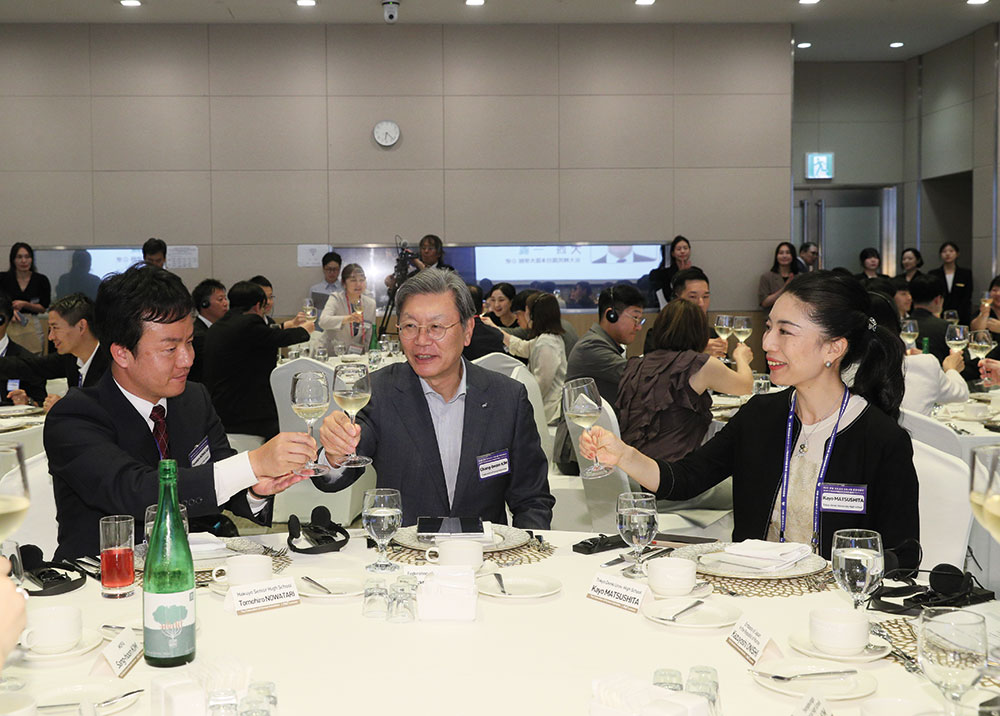in Story & News
FKI News
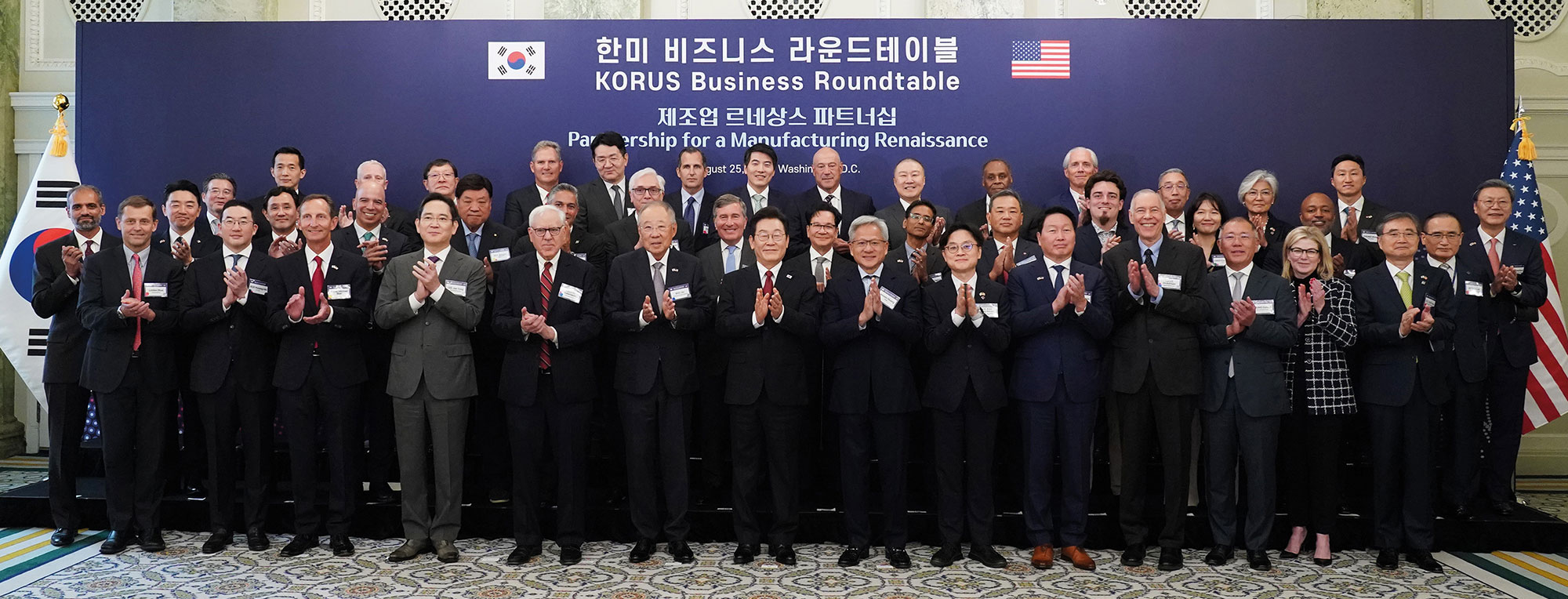
KORUS Business Roundtable Held
FKI held the “KORUS Business Roundtable: Partnership for a Manufacturing Renaissance” on August 25 (local time) at the Willard Hotel in Washington, D.C. Coinciding with President Lee Jae Myung’s first visit to the United States, the meeting brought together more than 40 participants, including prominent business leaders and government officials from both countries. The participants exchanged views on three core areas advanced industries (semiconductors, AI, biotechnology, etc.), strategic industries (shipbuilding, nuclear energy, energy, defense, etc.), and supply chains (mobility, batteries, core materials, etc.) and affirmed their commitment to opening a new chapter in Korea–U.S. cooperation in this new era.
32nd Pacific Economic Cooperation Council (PECC) General Meeting Held
In anticipation of the APEC 2025 Economic Leaders’ Meeting to be held in Gyeongju from October 31 to November 1, FKI and the Korea Institute for International Economic Policy (KIEP) jointly hosted the 32nd Pacific Economic Cooperation Council (PECC)* General Meeting on August 12 at the Grand Ballroom of the FKI Tower Conference Center in Yeouido.
Held in Seoul to support Korea’s first term as APEC chair in 20 years, the PECC General Meeting addressed the theme, “Reimagining Asia-Pacific Cooperation: Trade, AI, and Demographics in a Shifting Global Landscape,” and featured in-depth discussions on the shifting global trade environment, innovation in artificial intelligence technologies, and the complex challenges posed by demographic change.
*An international economic cooperation body comprising government, business, and academic experts. As APEC’s official observer and think tank, it proposes policy solutions to key economic issues in the Asia-Pacific region.
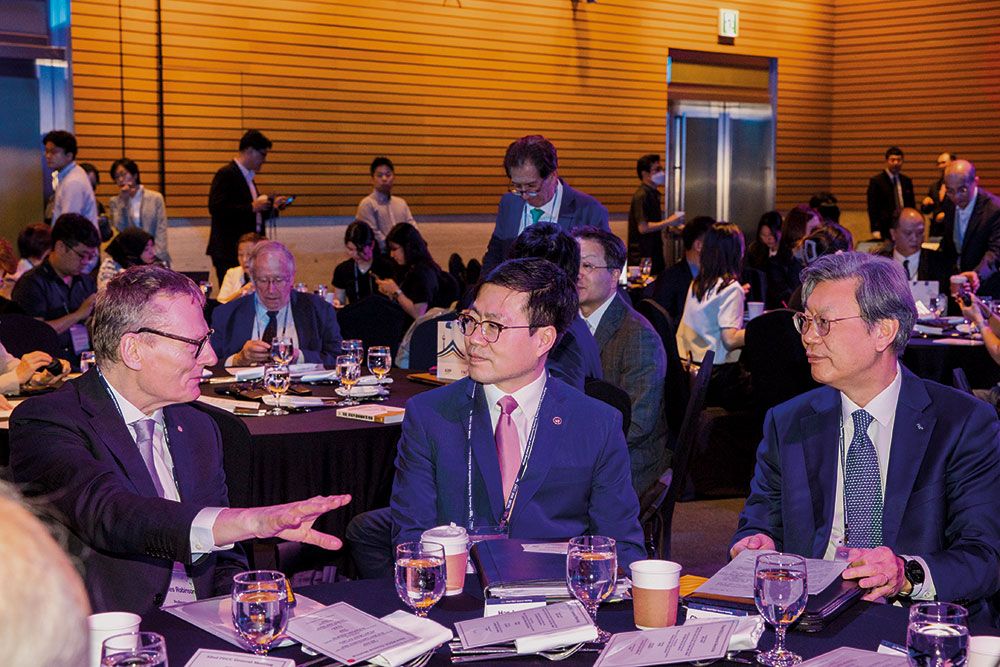
Investment Plans of Top 500 Companies for the Second Half of 2025
Despite growing geopolitical and economic uncertainty, nearly 8 out of 10 large corporations (78.4%) plan to maintain their investment levels in the second half of this year. FKI announced these findings based on a survey conducted by research firm Mono Research of Korea’s top 500 companies by revenue (with 120 firms responding).
According to the survey, 78.4% of responding companies plan to invest at a level similar to the first half. Meanwhile, 13.3% responded that they would reduce investment, and 8.3% indicated an increase. FKI explained that although companies have shown caution toward new investments amid growing export uncertainty and prolonged sluggish domestic demand, many appear ready to maintain investment levels on expectations of economic stimulus measures and improving market conditions under the new administration.
K-Vacance Campaign Launched to Revive Domestic Consumption
On July 8, FKI held the K-Vacance Campaign in partnership with the National Assembly, the Ministry of Culture, Sports and Tourism, and major metropolitan and provincial governments. The event took place at the National Assembly and Cheonggye Plaza in Seoul to promote domestic tourism. Visitors to Cheonggye Plaza enjoyed various programs, including the “Paldo Marble” event, which offered vacation prize giveaways, local government booths promoting tourist destinations and distributing souvenirs, and tasting booths featuring regional foods.
FKI organized the campaign to support small businesses and local merchants struggling with weak domestic demand. FKI stated it will continue to lead initiatives aimed at revitalizing the domestic economy and improving livelihoods.
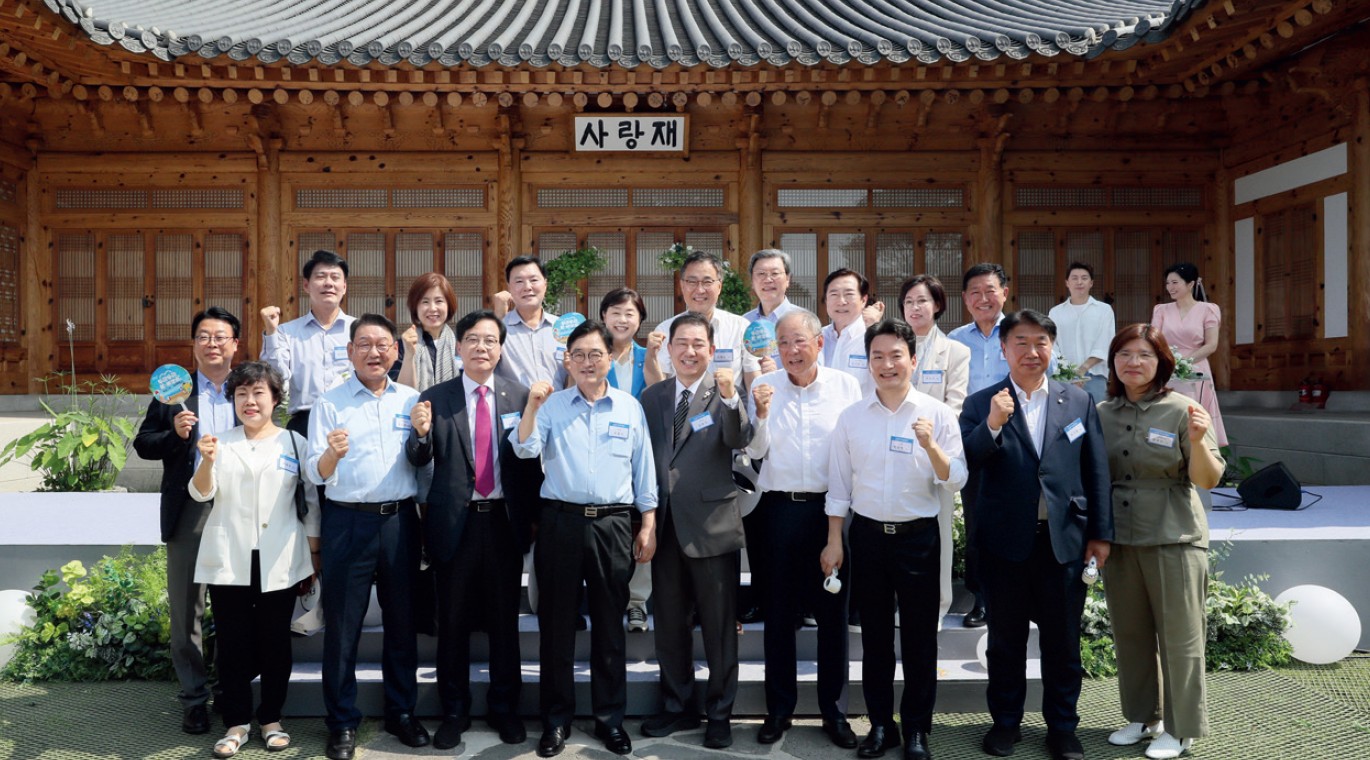
Book Talk Held in Commemoration of World Population Day
In recognition of World Population Day, the Korea Economic Research Institute (KERI) and RH Korea (RHK) co-hosted a book talk on July 9 to mark the publication of The Future We Must Prepare for Now, which diagnoses the future of the Korean economy amid low birth rates and aging demographics while exploring policy solutions.
The event was joined by co-authors from KERI and external experts, who formed a special panel to discuss topics such as labor market changes in an era of population decline, challenges related to marriage, childbirth, and employment, and the need to build a society where No One is Wasted (NOW).*
*A society where every individual can fully realize their potential, enjoy a guaranteed quality of life, and feel empowered and supported to have children
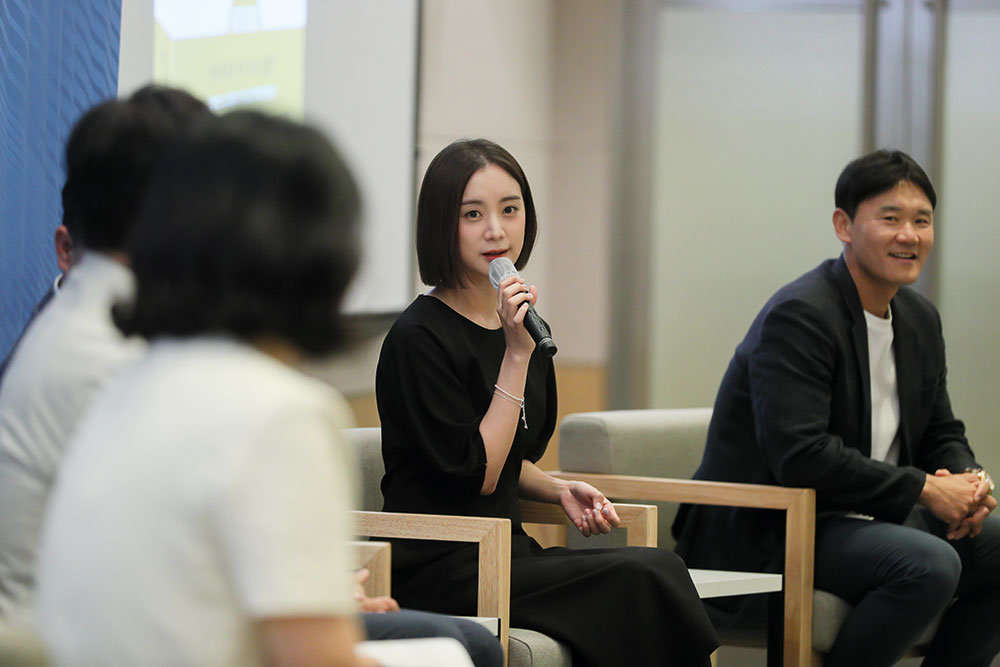
Export Outlook for the Second Half of 2025
A recent survey revealed that uncertainties surrounding tariffs imposed by the United States are expected to be the most significant variable affecting Korea’s exports in the second half of the year. FKI conducted the “H2 2025 Export Outlook Survey” through Mono Research, targeting the top 1,000 firms by revenue engaged in Korea’s ten leading export industries* (with 150 companies responding).
According to the findings, Korean companies project that exports in the second half of the year will decrease by an average of 1.6% compared to the same period last year. While four sectors including electronic components (1.3%) and biohealth (1.6%) are expected to see export growth, six sectors including steel (–5.0%) and shipbuilding (–2.5%) are forecast to experience declines. When asked about the greatest export risk in the second half, 53.3% of export companies identified “Trump administration tariff policies,” followed by “demand contraction from global low growth” (14.0%) and “escalation of U.S.–China trade conflict” (12.7%).
*Steel, shipbuilding, petrochemicals (including refining), general machinery, automobiles, semiconductors, biohealth, electronic components (including displays and mobile communication devices), auto parts, and computers.
38th FKI CEO Jeju Summer Forum Held
FKI hosted its 38th annual CEO Jeju Summer Forum from July 16 to 19 under the theme “Entrepreneurial Spirit Turning Crisis into Opportunity, Challenge and Innovation.” The forum drew over 500 corporate leaders who gathered to explore strategies for entrepreneurship and future growth.
In his opening remarks, Chairman jin Roy Ryu emphasized that FKI would serve as an AI hub linking the government and industry, contributing to the creation of a Korean-style AI ecosystem and advancing Korea’s position as a global top-three AI powerhouse. He added that achieving developed-nation status requires not only economic strength but also cultural capacity and soft power.
HYBE CEO Jae-sang Lee delivered the keynote speech titled, “The Crisis and Challenge of K-Pop: HYBE’s Global Expansion for Sustainable Growth.” From the second day onward, business leaders from key sectors digital finance, AI-powered manufacturing, content innovation, the AI ecosystem, and healthcare shared forward-looking strategies and innovative response cases to the rapidly changing environment.
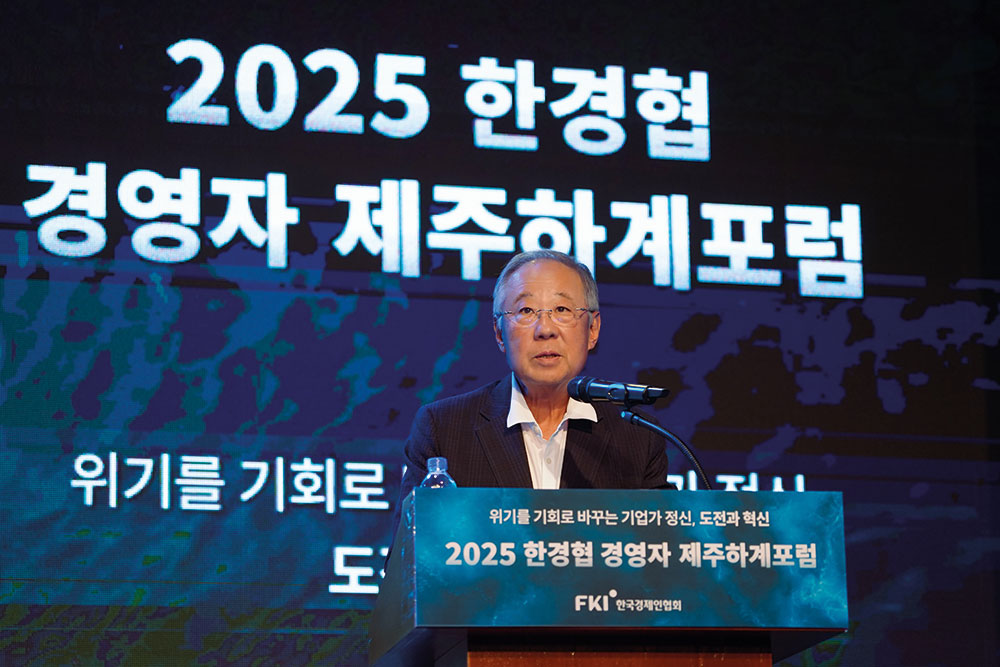
FKI Donates KRW 500 Million to Support Flood Recovery
The Korean business community has stepped up to support recovery efforts following the record-breaking torrential rains that struck the country this summer, causing dozens of casualties and over 4,000 cases of property damage nationwide. On July 22, FKI donated KRW 500 million to the Korea Disaster Relief Association. FKI Chairman Jin Roy Ryu stated, “It is deeply regrettable that such widespread damage has occurred just as we are striving to overcome the downturn in regional economies and domestic demand,” and urged companies to unite in taking an active role in the recovery effort. Separately, Poongsan Group also contributed KRW 500 million to support flood recovery.
Expert Roundtable on Korea–U.S. Trade Issues Held
Following the conclusion of Korea–U.S. trade negotiations on July 30 (local time), FKI held a roundtable titled, “The Evolving U.S.-Korea Economic Alliance: From Tariffs to Technology and Industry Partnership,” on August 5 at the FKI Tower Conference Center. Participants included Jeffrey J. Schott, Senior Fellow at the Peterson Institute for International Economics (PIIE); Patrick M. Cronin, Asia-Pacific Security Chair at the Hudson Institute; Professor Myung-hee Yoo of Seoul National University Graduate School of International Studies; Seok-young Choi, Advisor at Lee & Ko; and Jae-min Lee, Dean of Seoul National University School of Law. The discussions explored the implications of the recent agreement and gave forecasts on future developments.
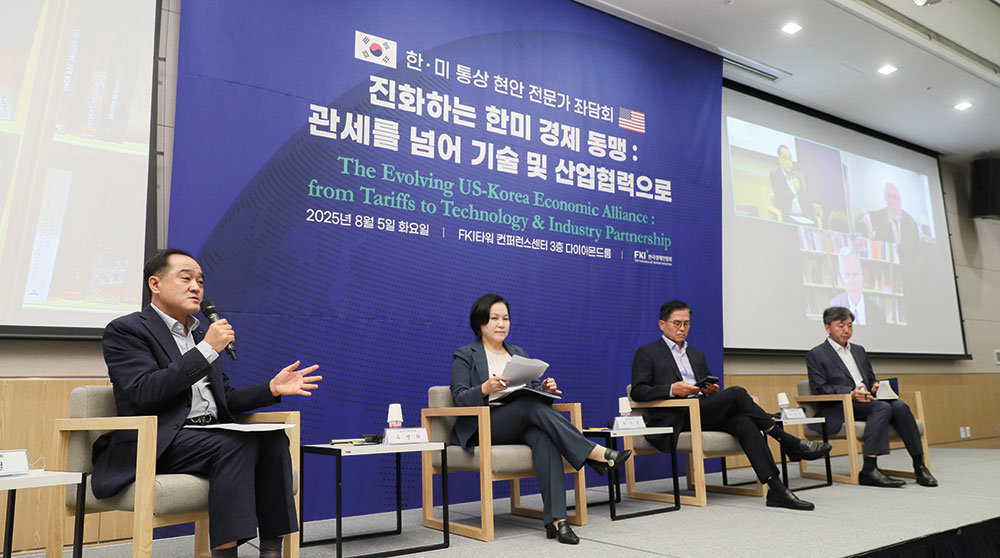
Opening Ceremony for First “Honor Store” to Mark the 80th National Liberation Day
On August 13, FKI held a plaque-hanging ceremony for the first store participating in its “Honor Store” (Store of Distinction and Honor) initiative, a support program for small business owners who are descendants of independence patriots. The project is a public-private partnership launched in celebration of the 80th National Liberation Day of Korea, jointly promoted by the Ministry of Patriots and Veterans Affairs, KB Financial Group, Heritage of Korean Independence, and Habitat for Humanity Korea. Designed to upgrade the business premises and boost the pride of descendants of distinguished contributors to the Independence Movement, the initiative provides space renovations as well as business consulting and other forms of support.
The first store selected was “Palette Art School,” operated by Soo-jeong Kim, great-granddaughter of independence activist Hyuk Kim. Improvements included exterior repairs, new signage, interior remodeling, and plumbing renovations. The upgrades will facilitate the establishment in providing a safer and more pleasant learning environment where local children can pursue their dreams and talents.
The Economic Cost of Inactive Youth and Policy Implications
As of July, the number of young adults in their 20s who reported doing neither work nor job-seeking activities reached 421,000, the highest figure on record. A study commissioned by FKI and conducted by Professor Mi-suk Lee of Changwon National University, titled “Economic Cost Estimation of the Rise in Inactive Youth,” estimated that the economic loss resulting from this trend over the past five years (2019–2023) totalled KRW 44.5 trillion.
Sang-ho Lee, head of FKI’s Economic and Industrial Research Department, stressed the need for tailored policy responses that reflect the diverse characteristics of inactive youth, along with broader efforts to stimulate domestic demand, ease regulations, and enhance corporate vitality to create new job opportunities.
4th Korea–Japan High School Teacher Exchange Program Held
To mark the 60th anniversary of Korea–Japan diplomatic normalization, the Korea–Japan Future Partnership Foundation hosted the 4th Korea–Japan High School Teacher Exchange Program from August 17 to 22. Fifty high school teachers selected from across Japan visited Korea to participate in a variety of programs, including school visits, a National Assembly tour, industrial site visits, cultural experiences, and expert lectures. Highlights included enjoying Korean-style cheering at a baseball game with “chimaek” (chicken and beer) and attending a classical concert featuring Korean and Japanese musicians conducted by maestro Nan-se Geum, giving participants a chance to experience “the real Korea” and deepen their understanding of the country.
